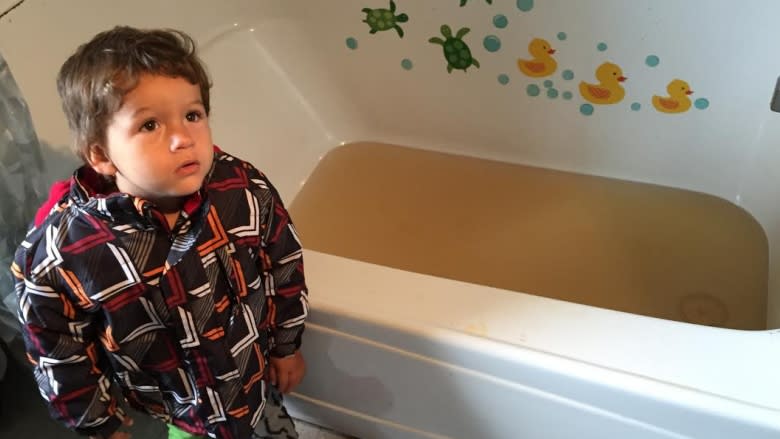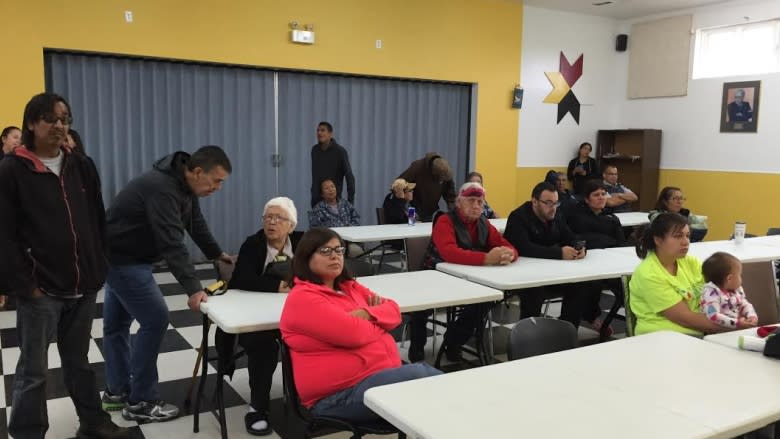Cape Breton's Potlotek First Nation protests dirty water
A rally at Potlotek First Nation in Cape Breton protested ongoing dirty water issues in the community Tuesday afternoon. Residents say the thick, black liquid coming out of their taps is "really gross" and "disgusting" and they want the federal government to intervene.
"I showered with dirt or metal or rust or whatever it was this morning," said Patricia Paul, who was one of nearly 40 protesters at the reserve's community centre Tuesday. "I still have shampoo in my hair."
Paul is one of the many people in the Potlotek community near St. Peter's who turned their taps on Tuesday to find the thick, black liquid coming out. She said her water didn't change colour until halfway through her shower.
No boil order
Paul has three children. She rinses her baby bottles with bottled water because she doesn't trust the tap water.
"I have to brush their teeth with bottled water in a pot," said Paul. "I have to sponge bath them. My kids love baths and they haven't been able to take a bath in weeks."
Although there is no boil order water advisory in place on the reserve, most people don't want to wash in the tap water or drink it.
"I don't like it. It's not fit to take a bath or a shower or wash your feet with it," said Elder Carmel Mellen, another resident at the protest.
Nearby community has clean water
Carmen Marshall, another community member, pointed out Potlotek's proximity to St. Peter's.
"It's just seven minutes away and they have clean water all the time," said Marshall.
Marshall, a mother of seven, said she's fed up with the dirty water issue.
"Sometimes when you wash their hair, it looks like there's mud coming out of there. Like, it's just disgusting, it's really gross," said Marshall. "For years they've been saying it's this and this and this. Well why isn't this getting fixed?"
'We have a problem with water'
Lindsay Marshall, the band's manager, said he is as exasperated as everyone else with the ongoing water problems.
"We've had the water tower freeze, we've had pumps break out or wear out because they're undersized, he said. "We've had weeks without water, we've had to truck in water ... We have a problem with water.
"But the fix is expensive and I don't know what commitment I can find or get somebody to provide to me that, yes, we're going to fix it and it's not going to take three to five years. That's what I want to hear," he said.
'No one wants to drink it'
Marshall said he knows there's iron and manganese in the water. He said the black, thick liquid that comes out of the taps is attributed to the silt that has built up over the years — within the pipes and within the water tower.
There are also leaves and other biomass that get into the open water source where the drinking water originates.
"I don't want expect anybody to drink the water," said Marshall. "They say it has fecal coliform and there's no boil water, but no one wants to drink it ... If you take a cup of that water, you'll see the sediment over time fall."
Even workers from the water treatment plant won't drink it — and they do several tests a day that meet the Health Canada standards.
Federal government involvement
"I also don't feel comfortable drinking this water," admitted Alec Marshall, the primary operator at the Potlotek Water Treatment plant. "As much as people say it's safe to say, and yes it is. But [if] you look at the colour and things like that, you know, I wouldn't drink it."
Paul said she hopes Prime Minister Justin Trudeau will keep his promise to spend $141.7 million to eliminate water issues on Indigenous reserves across Canada, with Potlotek at the top of the list.
"To actually come here and look at our water, they're not going to want to shower in it," said Paul. "They have little kids, so do we. We don't want to put our kids in that water. I'm sure they're not going to so why make us suffer?"
Lindsay Marshall said he also wants to get their plight to Trudeau's ears. Marshall said he will be contacting his MP, Rodger Cuzner, and asking him to take their concerns to Ottawa.



